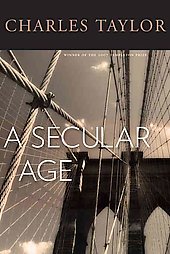Charles Taylor’s A Secular Age is an inspired yet rigorously argued Wagnerian effort to analyze the distinctive anxieties of modern…
A Secular Age

This discussion of Charles Taylor’s A Secular Age is the first discussion on The Immanent Frame. You might want to begin by reading the first essay by Robert Bellah here.
The discussion hosted below expanded to include critical conversation about the edited volume Varieties of Secularism in a Secular Age, edited by Michael Warner, Jonathan VanAntwerpen, and Craig Calhoun, in 2010.
For a sub-thread regarding “Sex in a Secular Age” click here.
For background on the founding of The Immanent Frame and the decision to host sustained dialogue on “the secular,” read Jonathan VanAntwerpen’s “Introducing The Immanent Frame” here.
After Durkheim
I continue, as I reread it, to have the highest opinion of A Secular Age and to believe that it…
That weird strange thing
That Charles Taylor’s massive book on the malaises and predicaments of secularity could be taken by so many distinguished intellectuals…
The truth?
As many here have noted, A Secular Age is a remarkable achievement. And it marks the culmination of a life’s…
Spinoza’s immanence
My hunch is that immanence does not necessarily lead to the “exclusive humanism” of which Taylor is so critical. My…
The missing all
Although technology may not possess a logic of its own, one would be hard pressed to deny its formative role…
Can sex be a minor form of spitting?
So what’s the problem? What’s the ethical crisis? For Taylor it is this: sexuality cannot carry the burden of the…
A Catholic Modernity?
Some readers of Sources of the Self, particularly its last few chapters, might have wondered how exactly Taylor’s indirect plea…
The Godless Delusion
“For Taylor,” writes John Patrick Diggins in The New York Times Book Review, “belief is not what science finds but…
Sex & aggression
I want to raise some questions about Taylor’s account of “our moral landscape” after the mainstreaming of the sexual revolution…











